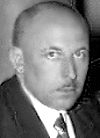AFFIDAVIT OF EMIL PUHL.
I, Emil Puhl, make the following deposition under oath:
I was a director of the Reichsbank during the entire period of Dr. Schacht's presidency of the Reichsbank from the years 1933 to 1939.
1. With respect to financing of armaments through the Reichsbank, although Mefo financing was stopped as of April 1, 1938, it is clear that the Reichsbank continued indirectly to help Hitler's armament program. This may be seen from the fact that the bank increased its portfolio of Inlands Wechsel, including of course commercial paper, from 5.8 billion RM in January 1938 to 7.9 billion RM on December 31, 1938. While I do not have the exact figures, a good deal of this increase took place between April 1, 1938 and December 31, 1938. This increase in the holding of internal bills was made by a proportionate increase in the bank note circulation, which rose from 5.6 billion RM on April 1, 1938 to 8.2 billion RM on December 31, 1938. Thus, in effect, by continuing to increase the bank note circulation and by absorbing bills which were paid for by this means, the Reichsbank was really making that much more credit available to the armaments program. This was clearly understood by all concerned.
2. There was a great increase in armaments during 1938 and this accounted for a certain amount of the increased note circulation. Thus, the bank note circulation rose by about 2.6 billion RM, that is from 5.6 to 8.2 billion RM from April 1, 1938 to December 31, 1938. A large amount of this increase was due to the pressure on the Reichsbank to discount mefo bills held in portfolios outside the Reichsbank. There is no question that the Reichsbank under Schacht during the year 1938 resorted to inflationary practices which aided rearmament. Since the Reichs-
499
EC-438
EC-438
bank had to meet the pressure of the money market resulting from the tendering for discount of large amounts of mefo bills automatically the bank note circulation was increased to meet the requirements.
3. It was understood at the beginning that mefo bill financing could be used only to the point where full employment and production were achieved. When full employment was reached it was clear to all that a further credit expansion in itself would not result in increased production. Simultaneously when such a point would be reached it was expected that the rise in the national income would provide sufficient taxes and savings for public loans to finance armaments from the budget. In the judgment of a number of directors of the Reichsbank, and this was the subject of discussion in the board, this point had been reached a year or two before mefo financing was stopped. When Schacht promised Hitler another 3 billion RM for financing mefo bills in early 1937 the Reichsbank Directorate was quite worried. The arrangement was made by Schacht with Hitler without prior agreement of the board of the bank which knew of the arrangements only after Schacht reported that he had made the agreement with Hitler. The feeling of members of the Reichsbank board at the time was 'that further armament financing should be done through the budget, mostly by an increase of taxation.
4. The high amount of mefo bills held by the Reichsbank was always considered risky, and, particularly as, in times of financial stringency, the bills outside the Reichsbank might be preserved for discount and require an increase in the note circulation and so lead to inflation. Mefo financing was an entirely risky proposition. The hope was that some day there would be a balancing of the budget and a provision for the repayment of these bills without resorting to new credits. It did not, however, work out that way. When Schacht saw that the risky situation which he had sponsored was becoming insoluble he was more and more anxious to get out. This desire to get out of a bad situation was for a long time the leitmotif of Schacht's conversation with the directors of the bank. He also suggested to give a warning signal to the Government against inflation.
I understand the English language.
[signed] Puhl
Sworn to before me this eighth day of November 1945 at Frankfurt, Germany.
[signed] Edward A. Tenenbaum ' 0—870114, 1st Lt. AC.
500
Search the archive
Affidavit concerning the Reichsbank's continued financing of armaments in 1938 by increasing the money supply, and the risk posed by the earlier use of Mefo bills
Authors
Emil Puhl (director & vice-president of the Reichsbank, Berlin)
Emil Puhl
German Nazi banker, VP Deutsche Bank,BIS, convicted of war crimes at Nuremberg (1889-1962)

- Born: 1889-08-28 (Berlin)
- Died: 1962-03-30 (Hamburg)
- Country of citizenship: Germany
- Occupation: banker; economist; politician
- Member of political party: Nazi Party
- Participant in: Pohl Trial (date: 1946-05-03; role: affiant)
- Employer: Bank for International Settlements; Deutsche Bank; Reichsbank (since: 1939-01-01)
- VIAF ID: https://viaf.org/viaf/30485602
Date: 08 November 1945
Literal Title: Affidavit of Emil Puhl
Defendant: Hjalmar Schacht
Total Pages: 2
Language of Text: English
Source of Text: Nazi conspiracy and aggression (Office of United States Chief of Counsel for Prosecution of Axis Criminality. Washington, D.C. : U.S. Government Printing Office, 1946.)
Evidence Code: EC-438
Citation: IMT (page 2569)
HLSL Item No.: 452751
Document Summary
EC-438: Sworn statement by Puhl re Reichsbank and Mefo bills